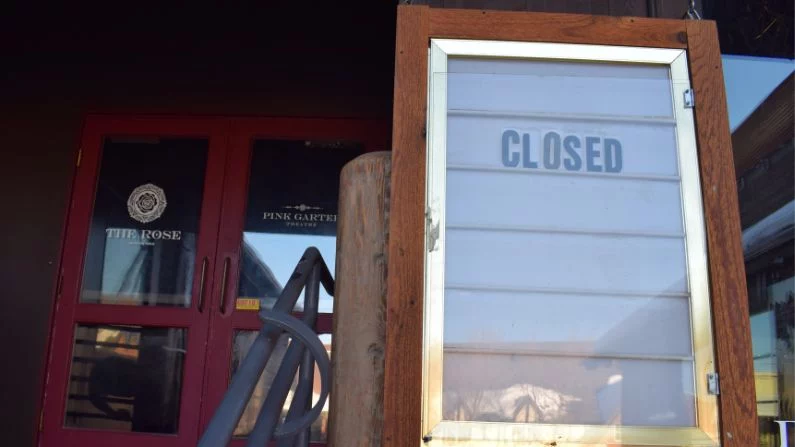Town Council transfers liquor license for The Rose to new owners
Community members are one step closer to resurrecting a popular local bar, The Rose. The Jackson Town Council voted unanimously on Nov. 5 to transfer The Rose’s liquor license to a new company taking over the Pink Garter building on Broadway, a block away from town square.
The Rose closed in October amid ownership changes. A Missouri businessman owned the building for years, but locals Tyler Davis, Joe Rice and Ted Staryk are now under contract to take it over. Davis is a real estate agent, while Rice owns the Blue Collar Restaurant Group and Staryk owns Snake River Brewing.
Davis told council members that securing the liquor license was the next step toward reopening The Rose. Dom Gagliardi most recently operated the bar and supported the new landlords at the Monday meeting.
“We as an entity had found that our business had run its course,” Gagliadi said. “We decided to terminate our lease so that we can open this up for a potential new owner of the building to set somebody up for success, and I believe these guys are that. So, I think that they have the right intentions, they understand our community and they want to take this to the next level, and that’s what that building really needs.”
Davis said in the meeting that the new owners are hopeful The Rose will reopen in the new year, but it’s unclear who will run the bar. Council members Arne Jorgensen and Jonathan Schechter were initially hesitant to approve the liquor license due to these uncertainties, but they ended up supporting the transfer.
Jackson saw record low temperatures this November
November this year was the coldest November on record in Jackson, according to Jim Woodmencey, the chief meteorologist at Mountain Weather. Woodmencey has been forecasting in Jackson for over 30 years and was shocked by the consistent cold temperatures.
He attributed the frigid conditions to consistent storms and other weather patterns.
“Sometimes we would get inversion, in other words the temperatures in the valley were much colder than the temperatures up in the mountains for instance,” Woodmencey said. “There were also a lot of days where we had cold temperatures, say single digits, up at 11,000 feet, top of the tram, and we also had below zero readings here in Jackson.”
The average temperature last month was 17 degrees — about 10 degrees lower than average. The previous coldest November on record was in 1938, when the average temperature was over 18 degrees.
Woodmencey said it wasn’t the daily temperatures that broke that record.
“It was just the cumulative month that ended up much colder than average, and that’s what broke the record,” he said.
According to Woodmencey, these colder temperatures are a trend in Jackson: October 2019 was the coldest October on record, and 2019 as a whole was the coldest year ever recorded in Jackson.
Development and elk migration can coexist in Greater Yellowstone Ecosystem, a new study finds
This story comes through a content-sharing partnership with Wyoming Public Media.
A new study highlights the importance of both protected and private lands in the Greater Yellowstone Ecosystem (GYE) for wildlife migration.
The study from over a dozen organizations specifically focuses on elk in the GYE, which includes much of western Wyoming and is “one of the largest nearly intact temperate-zone ecosystems on Earth,” according to the National Park Service.
Researchers found that elk depend heavily on private land during the winter. Migration routes in this area also go through protected lands like national parks and forests, but private property is what links the routes together.
“A lot of these private lands that elk are using, they don’t have any sort of zoning on them,” said lead researcher Laura Gigliotti. “So, this could mean that there’s potential for unregulated development going forward.”
Gigliotti said future development — like subdivisions and commercial zoning — are likely inevitable, as the area’s population is growing. But she said that development can coexist with wildlife if certain measures are taken, like creating wildlife-friendly fences and not overpopulating the land.
“But an important thing is just making sure that there’s enough space in these private lands,” Gigliotti said. “And making sure that there’s connectivity between these winter ranges and the migratory routes in the summer ranges with these animals.”
In November, the Bureau of Land Management announced a new policy that prioritizes habitat connectivity for wildlife migration. The policy will include strategies such as not permitting future energy projects in migration routes and removing unnecessary fences.
Teton County housing official to represent Jackson Hole on national stage
Teton County’s lead housing official April Norton is one of 30 members on a new national task force formed with the goal of finding housing solutions. The National Association of County Officials group is composed of representatives from across the country, from Sacramento County, California to Miami-Dade County, Florida.
Norton attended a kick-off event in Washington D.C. in November. She said the group is a reminder that Teton County isn’t alone.
“It reminded me that whether you’re a small county of 20,000 people or you’re a large county of millions of people, there’s a lot of similarity in the challenges we’re all facing,” Norton said. “And it’s not just for people who are at the very low income range. It is for middle class Americans, and it’s middle class Americans here in Teton County. It’s middle class Americans in Ohio.”
Norton says that Teton County is ahead of the curve compared to other tourism communities — especially when it comes to collecting data. Moving forward, she’s excited to learn about ways her department could continue to partner with the private sector to address the housing crisis.
The task force is commissioning research papers on different housing solutions. It will present its findings in July.
Read KHOL’s full coverage here.






